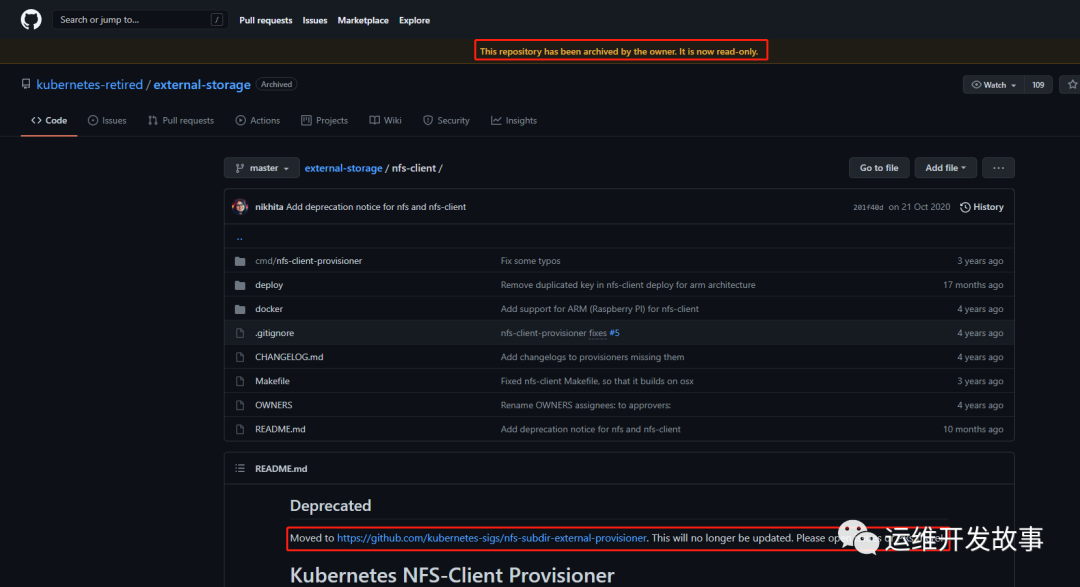CFSDN坚持开源创造价值,我们致力于搭建一个资源共享平台,让每一个IT人在这里找到属于你的精彩世界.
这篇CFSDN的博客文章K8s使用新版NFS Provisioner配置Subdir由作者收集整理,如果你对这篇文章有兴趣,记得点赞哟.

背景 。
NFS在k8s中作为volume存储已经没有什么新奇的了,这个是最简单也是最容易上手的一种文件存储。最近有一个需求需要在k8s中使用NFS存储,于是记录如下,并且还存在一些骚操作和过程中遇到的坑点,同时记录如下.
访问nfs provisioner的GitHub仓库会发现他提示你该仓库已经被个人归档并且状态已经是只读了.
老的NFS仓库地址:https://github.com/kubernetes-retired/external-storage/tree/master/nfs-client 。
下面Deprecated表示仓库已经移动到了另外一个GitHub地址了,也就是说他这个仓库已经不在更新了,持续更新的仓库是Moved to 后面指定的仓库了.
新仓库地址:https://github.com/lorenzofaresin/nfs-subdir-external-provisioner 。
发现更新的仓库中相比老仓库多了一个功能:添加了一个参数pathPattern,实际上也就是通过设置这个参数可以配置PV的子目录.

nfs-client-provisioner部署 。
带着好奇心我们来部署一下新的NFS,以下yaml配置文件可以在项目中的deploy目录中找到。我这里的配置根据我的环境稍微做了更改,比如NFS的服务的IP地址。你们根据实际情况修改成自己的nfs服务器地址和path路径.
「本次实践在k8s 1.19.0上」 。
class.yaml 。
- $ cat class.yaml
- apiVersion: storage.k8s.io/v1
- kind: StorageClass
- metadata:
- name: managed-nfs-storage
- provisioner: k8s-sigs.io/nfs-subdir-external-provisioner # or choose another name, must match deployment's env PROVISIONER_NAME'
- parameters:
- archiveOnDelete: "false"
deployment.yaml 。
- apiVersion: apps/v1
- kind: Deployment
- metadata:
- name: nfs-client-provisioner
- labels:
- app: nfs-client-provisioner
- # replace with namespace where provisioner is deployed
- namespace: kube-system
- spec:
- replicas: 1
- strategy:
- type: Recreate
- selector:
- matchLabels:
- app: nfs-client-provisioner
- template:
- metadata:
- labels:
- app: nfs-client-provisioner
- spec:
- serviceAccountName: nfs-client-provisioner
- containers:
- - name: nfs-client-provisioner
- image: k8s.gcr.io/sig-storage/nfs-subdir-external-provisioner:v4.0.2
- volumeMounts:
- - name: nfs-client-root
- mountPath: /persistentvolumes
- env:
- - name: PROVISIONER_NAME
- value: k8s-sigs.io/nfs-subdir-external-provisioner
- - name: NFS_SERVER
- value: 172.16.33.4
- - name: NFS_PATH
- value: /
- volumes:
- - name: nfs-client-root
- nfs:
- server: 172.16.33.4
- path: /
rbac.yaml 。
- apiVersion: v1
- kind: ServiceAccount
- metadata:
- name: nfs-client-provisioner
- # replace with namespace where provisioner is deployed
- namespace: kube-system
-
- kind: ClusterRole
- apiVersion: rbac.authorization.k8s.io/v1
- metadata:
- name: nfs-client-provisioner-runner
- rules:
- - apiGroups: [""]
- resources: ["nodes"]
- verbs: ["get", "list", "watch"]
- - apiGroups: [""]
- resources: ["persistentvolumes"]
- verbs: ["get", "list", "watch", "create", "delete"]
- - apiGroups: [""]
- resources: ["persistentvolumeclaims"]
- verbs: ["get", "list", "watch", "update"]
- - apiGroups: ["storage.k8s.io"]
- resources: ["storageclasses"]
- verbs: ["get", "list", "watch"]
- - apiGroups: [""]
- resources: ["events"]
- verbs: ["create", "update", "patch"]
-
- kind: ClusterRoleBinding
- apiVersion: rbac.authorization.k8s.io/v1
- metadata:
- name: run-nfs-client-provisioner
- subjects:
- - kind: ServiceAccount
- name: nfs-client-provisioner
- # replace with namespace where provisioner is deployed
- namespace: kube-system
- roleRef:
- kind: ClusterRole
- name: nfs-client-provisioner-runner
- apiGroup: rbac.authorization.k8s.io
-
- kind: Role
- apiVersion: rbac.authorization.k8s.io/v1
- metadata:
- name: leader-locking-nfs-client-provisioner
- # replace with namespace where provisioner is deployed
- namespace: kube-system
- rules:
- - apiGroups: [""]
- resources: ["endpoints"]
- verbs: ["get", "list", "watch", "create", "update", "patch"]
-
- kind: RoleBinding
- apiVersion: rbac.authorization.k8s.io/v1
- metadata:
- name: leader-locking-nfs-client-provisioner
- # replace with namespace where provisioner is deployed
- namespace: kube-system
- subjects:
- - kind: ServiceAccount
- name: nfs-client-provisioner
- # replace with namespace where provisioner is deployed
- namespace: kube-system
- roleRef:
- kind: Role
- name: leader-locking-nfs-client-provisioner
- apiGroup: rbac.authorization.k8s.io
注意:
- 镜像无法拉取的话可以从国外机器拉取镜像然后再导入
- rbac基本无需更改,配置子目录的时候需要更改class.yaml文件,后面会说
创建所有资源文件 。
- kubectl apply -f class.yaml -f deployment.yaml -f rbac.yaml
通过一个简单的例子来创建pvc 。
- $ cat test-pvc-2.yaml
- kind: PersistentVolumeClaim
- apiVersion: v1
- metadata:
- name: test-pvc-2
- namespace: nacos
- spec:
- storageClassName: "managed-nfs-storage"
- accessModes:
- - ReadWriteMany
- resources:
- requests:
- storage: 10Gi
-
- $ cat test-nacos-pod-2.yaml
- apiVersion: apps/v1
- kind: StatefulSet
- metadata:
- name: nacos-c1-sit-tmp-1
- labels:
- appEnv: sit
- appName: nacos-c1-sit-tmp-1
- namespace: nacos
- spec:
- serviceName: nacos-c1-sit-tmp-1
- replicas: 3
- selector:
- matchLabels:
- appEnv: sit
- appName: nacos-c1-sit-tmp-1
- template:
- metadata:
- labels:
- appEnv: sit
- appName: nacos-c1-sit-tmp-1
- spec:
- dnsPolicy: ClusterFirst
- containers:
- - name: nacos
- image: www.ayunw.cn/library/nacos/nacos-server:1.4.1
- ports:
- - containerPort: 8848
- env:
- - name: NACOS_REPLICAS
- value: "1"
- - name: MYSQL_SERVICE_HOST
- value: mysql.ayunw.cn
- - name: MYSQL_SERVICE_DB_NAME
- value: nacos_c1_sit
- - name: MYSQL_SERVICE_PORT
- value: "3306"
- - name: MYSQL_SERVICE_USER
- value: nacos
- - name: MYSQL_SERVICE_PASSWORD
- value: xxxxxxxxx
- - name: MODE
- value: cluster
- - name: NACOS_SERVER_PORT
- value: "8848"
- - name: PREFER_HOST_MODE
- value: hostname
- - name: SPRING_DATASOURCE_PLATFORM
- value: mysql
- - name: TOMCAT_ACCESSLOG_ENABLED
- value: "true"
- - name: NACOS_AUTH_ENABLE
- value: "true"
- - name: NACOS_SERVERS
- value: nacos-c1-sit-0.nacos-c1-sit-tmp-1.nacos.svc.cluster.local:8848 nacos-c1-sit-1.nacos-c1-sit-tmp-1.nacos.svc.cluster.local:8848 nacos-c1-sit-2.nacos-c1-sit-tmp-1.nacos.svc.cluster.local:8848
- imagePullPolicy: IfNotPresent
- resources:
- limits:
- cpu: 500m
- memory: 5Gi
- requests:
- cpu: 100m
- memory: 512Mi
- volumeMounts:
- - name: data
- mountPath: /home/nacos/plugins/peer-finder
- subPath: peer-finder
- - name: data
- mountPath: /home/nacos/data
- subPath: data
- volumeClaimTemplates:
- - metadata:
- name: data
- spec:
- storageClassName: "managed-nfs-storage"
- accessModes:
- - "ReadWriteMany"
- resources:
- requests:
- storage: 10Gi
查看pvc以及nfs存储中的数据 。
- # ll
- total 12
- drwxr-xr-x 4 root root 4096 Aug 3 13:30 nacos-data-nacos-c1-sit-tmp-1-0-pvc-90d74547-0c71-4799-9b1c-58d80da51973
- drwxr-xr-x 4 root root 4096 Aug 3 13:30 nacos-data-nacos-c1-sit-tmp-1-1-pvc-18b3e220-d7e5-4129-89c4-159d9d9f243b
- drwxr-xr-x 4 root root 4096 Aug 3 13:31 nacos-data-nacos-c1-sit-tmp-1-2-pvc-26737f88-35cd-42dc-87b6-3b3c78d823da
-
- # ll nacos-data-nacos-c1-sit-tmp-1-0-pvc-90d74547-0c71-4799-9b1c-58d80da51973
- total 8
- drwxr-xr-x 2 root root 4096 Aug 3 13:30 data
- drwxr-xr-x 2 root root 4096 Aug 3 13:30 peer-finder
可以发现手动创建了一个PVC,并且创建一个nacos的deployment使用这个PVC后已经自动创建出相应的PV并且与之绑定,且挂载了数据.
配置子目录 。
删除之前创建的class.yaml,添加pathPattern参数,然后重新生成sc 。
- $ kubectl delete -f class.yaml
-
- $ vi class.yaml
- apiVersion: storage.k8s.io/v1
- kind: StorageClass
- metadata:
- name: managed-nfs-storage
- provisioner: k8s-sigs.io/nfs-subdir-external-provisioner # or choose another name, must match deployment's env PROVISIONER_NAME'
- parameters:
- archiveOnDelete: "false"
- # 添加以下参数
- pathPattern: "${.PVC.namespace}/${.PVC.annotations.nfs.io/storage-path}"
创建pvc来测试生成的PV目录是否生成了子目录 。
- $ cat test-pvc.yaml
- kind: PersistentVolumeClaim
- apiVersion: v1
- metadata:
- name: test-pvc-2
- namespace: nacos
- annotations:
- nfs.io/storage-path: "test-path-two" # not required, depending on whether this annotation was shown in the storage class description
- spec:
- storageClassName: "managed-nfs-storage"
- accessModes:
- - ReadWriteMany
- resources:
- requests:
- storage: 100Mi
创建资源 。
- kubectl apply -f class.yaml -f test-pvc.yaml
查看结果 。
- # pwd
- /data/nfs# ll nacos/
- total 4
- drwxr-xr-x 2 root root 4096 Aug 3 10:21 nacos-pvc-c1-pro
-
- # tree -L 2 .
- .
- └── nacos
- └── nacos-pvc-c1-pro
- 2 directories, 0 files
在mount了nfs的机器上查看生成的目录,发现子目录的确已经生成,并且子目录的层级是以"命名空间/注解名称"为规则的。刚好符合了上面StorageClass中定义的pathPattern规则.
provisioner高可用 。
生产环境中应该尽可能的避免单点故障,因此此处考虑provisioner的高可用架构 更新后的provisioner配置如下:
- $ cat nfs-deployment.yaml
- apiVersion: apps/v1
- kind: Deployment
- metadata:
- name: nfs-client-provisioner
- labels:
- app: nfs-client-provisioner
- # replace with namespace where provisioner is deployed
- namespace: kube-system
- spec:
- # 因为要实现高可用,所以配置3个pod副本
- replicas: 3
- strategy:
- type: Recreate
- selector:
- matchLabels:
- app: nfs-client-provisioner
- template:
- metadata:
- labels:
- app: nfs-client-provisioner
- spec:
- serviceAccountName: nfs-client-provisioner
- imagePullSecrets:
- - name: registry-auth-paas
- containers:
- - name: nfs-client-provisioner
- image: www.ayunw.cn/nfs-subdir-external-provisioner:v4.0.2-31-gcb203b4
- imagePullPolicy: IfNotPresent
- volumeMounts:
- - name: nfs-client-root
- mountPath: /persistentvolumes
- env:
- - name: PROVISIONER_NAME
- value: k8s-sigs.io/nfs-subdir-external-provisioner
- # 设置高可用允许选举
- - name: ENABLE_LEADER_ELECTION
- value: "True"
- - name: NFS_SERVER
- value: 172.16.33.4
- - name: NFS_PATH
- value: /
- volumes:
- - name: nfs-client-root
- nfs:
- server: 172.16.33.4
- path: /
重建资源 。
- kubectl delete -f nfs-class.yaml -f nfs-deployment.yaml
- kubectl apply -f nfs-class.yaml -f nfs-deployment.yaml
查看provisioner高可用是否生效 。
- # kubectl get po -n kube-system | grep nfs
- nfs-client-provisioner-666df4d979-fdl8l 1/1 Running 0 20s
- nfs-client-provisioner-666df4d979-n54ps 1/1 Running 0 20s
- nfs-client-provisioner-666df4d979-s4cql 1/1 Running 0 20s
- # kubectl logs -f
- I0803 06:04:41.406441 1 leaderelection.go:242] attempting to acquire leader lease kube-system/nfs-provisioner-baiducfs...
- ^C
- # kubectl logs -f
- I0803 06:04:41.961617 1 leaderelection.go:242] attempting to acquire leader lease kube-system/nfs-provisioner-baiducfs...
- ^C
- [root@qing-core-kube-master-srv1 nfs-storage]# kubectl logs -f
- I0803 06:04:39.574258 1 leaderelection.go:242] attempting to acquire leader lease kube-system/nfs-provisioner-baiducfs...
- I0803 06:04:39.593388 1 leaderelection.go:252] successfully acquired lease kube-system/nfs-provisioner-baiducfs
- I0803 06:04:39.593519 1 event.go:278] Event(v1.ObjectReference{Kind:"Endpoints", Namespace:"kube-system", Name:"nfs-provisioner-baiducfs", UID:"3d5cdef6-57da-445e-bcd4-b82d0181fee4", APIVersion:"v1", ResourceVersion:"1471379708", FieldPath:""}): type: 'Normal' reason: 'LeaderElection' nfs-client-provisioner-666df4d979-s4cql_590ac6eb-ccfd-4653-9de5-57015f820b84 became leader
- I0803 06:04:39.593559 1 controller.go:820] Starting provisioner controller nfs-provisioner-baiducfs_nfs-client-provisioner-666df4d979-s4cql_590ac6eb-ccfd-4653-9de5-57015f820b84!
- I0803 06:04:39.694505 1 controller.go:869] Started provisioner controller nfs-provisioner-baiducfs_nfs-client-provisioner-666df4d979-s4cql_590ac6eb-ccfd-4653-9de5-57015f820b84!
通过successfully acquired lease kube-system/nfs-provisioner-baiducfs可以看到第三个pod成功被选举为leader节点了,高可用生效.
报错 。
在操作过程中遇到describe pod发现报错如下:
- Mounting arguments:
- Output: Running scope as unit: run-rdcc7cfa6560845969628fc551606e69d.scope
- mount: /data/kubernetes/kubelet/pods/2ca70aa9-433c-4d10-8f87-154ec9569504/volumes/kubernetes.io~nfs/nfs-client-root: bad option; for several filesystems (e.g. nfs, cifs) you might need a /sbin/mount.<type> helper program.
- Warning FailedMount 10s kubelet, node1.ayunw.cn MountVolume.SetUp failed for volume "nfs-client-root" : mount failed: exit status 32
- Mounting command: systemd-run
解决方式:经排查原因是pod被调度到的节点上没有安装nfs客户端,只需要安装一下nfs客户端nfs-utils即可.
原文链接:https://mp.weixin.qq.com/s/3Oo_bSg5umu2vdH8XgsGQA 。
最后此篇关于K8s使用新版NFS Provisioner配置Subdir的文章就讲到这里了,如果你想了解更多关于K8s使用新版NFS Provisioner配置Subdir的内容请搜索CFSDN的文章或继续浏览相关文章,希望大家以后支持我的博客! 。



我是一名优秀的程序员,十分优秀!